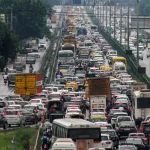BEYOND OPTIMISM
The political landscape in Jammu and Kashmir has always been complex, but in recent years, it has become even more convoluted with the abrogation of Article 370, the bifurcation of the state into two Union Territories (UTs), and the imposition of direct rule through the Lieutenant Governor (LG) administration. While the elections in Jammu and Kashmir might eventually pave the way for a new government, there is little reason for optimism about the challenges that lie ahead. The focus, for now, should not merely be on the excitement of government formation but on the immense challenges this new government will face.
A Shift from Full-Fledged Statehood to Union Territory
One of the most significant hurdles for any government in Jammu and Kashmir today is the transition from a full-fledged state with its own constitution and special status to being a Union Territory, where many powers now lie with the Centre and the LG.
Historically, Jammu and Kashmir enjoyed a unique position under Article 370 of the Indian Constitution, which granted it autonomy over all matters except defense, communication, and foreign affairs. However, in August 2019, this article was abrogated, stripping the region of its special status and bifurcating it into two Union Territories—Jammu and Kashmir with a legislative assembly and Ladakh without one.
The new government, once formed, will have to function under the constraints of being a Union Territory, where the LG holds substantial power. The abrogation of Article 370 not only diluted the region’s autonomy but also centralized decision-making in New Delhi, reducing the role of elected representatives in local governance.
Restoration of Statehood: The First Challenge
One of the foremost challenges for the newly formed government will be the restoration of statehood. While the Indian government has made statements about restoring statehood to Jammu and Kashmir at an “appropriate time,” there has been no clear timeline or roadmap for this. The return to full statehood is not just a symbolic issue but one that has practical implications for governance, resource allocation, and the local economy.
For the new government, the struggle to regain statehood will likely be a top priority, as it directly impacts their ability to make decisions and govern effectively. Without statehood, the LG continues to wield considerable authority, especially over critical areas like public order, policing, and land, leaving little room for the elected government to maneuver.
A Constrained Legislature
Even when statehood is restored, the elected government in Jammu and Kashmir will likely find itself functioning within a constrained legislative framework. Following the abrogation of Article 370, many of the laws that previously applied to Jammu and Kashmir were repealed, and central laws were extended to the region.
The newly elected representatives may find themselves operating within a legislative framework that limits their ability to enact laws and policies tailored to the specific needs of Jammu and Kashmir. Moreover, the LG retains the authority to reserve bills for the President’s consideration, further curtailing the power of the legislative assembly.
This limitation on legislative powers will likely be a significant challenge for the new government as it navigates governance in a post-Article 370 environment. Without the autonomy to legislate on key issues, the government’s effectiveness in addressing local concerns may be severely hindered.
The Promises and Aspirations in the Manifesto
Political parties vying for power in Jammu and Kashmir have outlined ambitious promises in their manifestos. These promises address pressing issues such as the release of political prisoners, the restoration of rights under Article 35A, the repeal of the Public Safety Act (PSA), addressing the unemployment crisis, and providing 200 units of free electricity.
However, in the current situation, many of these promises are challenging to fulfill. For instance, the demand for releasing political prisoners held since the abrogation of Article 370 is not just a regional issue but one that involves the central government’s stance on security. Likewise, restoring the rights under Article 35A, which previously allowed J&K residents to maintain exclusive property and employment rights, would require reversing constitutional changes made by Parliament—an improbable task in the current political climate.
The promise to repeal the Public Safety Act (PSA), which allows for the detention of individuals without formal charges for extended periods, is also a sensitive issue, especially given that the central government views it as a tool for maintaining public order in a region that has faced decades of unrest. The new government may face opposition from the Centre when it comes to any effort to dilute or repeal this act.
Tackling unemployment is another key manifesto promise. With Jammu and Kashmir’s unemployment rate one of the highest in the country, addressing this issue is of utmost importance. However, given the region’s economic constraints, political instability, and lack of major investments, job creation will be a challenging task for the new government.
Similarly, the promise of providing 200 units of free electricity is attractive but difficult to implement, given the existing power sector’s constraints in the region. Jammu and Kashmir’s power infrastructure is already under strain, with frequent outages, transmission losses, and high operational costs. Ensuring that this promise does not place further financial burden on the power sector will require careful planning and resource allocation.
Economic Challenges and Development
Another major challenge facing the new government will be the fragile economic situation in Jammu and Kashmir. The region has long struggled with underdevelopment, lack of investment, and high unemployment rates. These issues have been exacerbated by the political turmoil following the abrogation of Article 370, the COVID-19 pandemic and ongoing security concerns.
While the central government has announced several development packages and infrastructure projects for Jammu and Kashmir, the region’s economy remains in a precarious state. The tourism industry, a significant contributor to the local economy, has been severely impacted by the political uncertainty and frequent shutdowns. Agriculture, another key sector, faces challenges such as lack of modernization, poor infrastructure, and market access issues.
The new government will need to focus on reviving the economy, attracting investment, and creating job opportunities. However, this will not be easy in an environment where security concerns continue to dominate, and the central government holds significant sway over economic decision-making.
Infrastructure Deficiencies
The Jammu and Kashmir region has long been plagued by infrastructure deficiencies, particularly concerning connectivity, power supply, and basic amenities. The region’s challenging terrain and harsh weather conditions, combined with decades of political instability, have hampered infrastructure development.
One of the major issues is the poor condition of the Jammu-Srinagar National Highway (NH44), which is frequently blocked due to landslides, snow, and poor maintenance. This highway is the lifeline of the Kashmir Valley, connecting it to the rest of the country, and its frequent closures cause significant hardships for travelers, disrupt supply chains, and lead to the wastage of perishable goods.
The new government will also face challenges in addressing the region’s power supply issues. Despite the region’s vast potential for hydropower generation, Jammu and Kashmir suffers from an unstable power supply, particularly during the winter months when demand is high. Ensuring a reliable supply of electricity will be critical for both the region’s development and the day-to-day lives of its citizens.
Moreover, many urban and rural areas in Jammu and Kashmir continue to suffer from inadequate drinking water supplies, poor sanitation, and lack of modern healthcare facilities. Addressing these infrastructure deficiencies will be crucial for the new government, but doing so will require significant financial resources and coordination with the central government.
Navigating the Political Landscape
The political environment in Jammu and Kashmir is fraught with challenges. The region is deeply divided along political, ethnic, and religious lines, and the abrogation of Article 370 has only deepened these divisions. The new government will need to navigate these complexities while trying to maintain peace and stability in the region.
Moreover, the new government will have to contend with the central government’s significant involvement in the region’s affairs. The LG, appointed by the central government, holds considerable power, particularly over critical areas like public order and land. Balancing the demands of local governance with the central government’s influence will be a key challenge for the new government.
Security Concerns
Jammu and Kashmir has long been a conflict zone, and the security situation remains fragile. Militancy, cross-border terrorism, and internal unrest continue to pose significant threats to peace and stability in the region. The new government will have to work closely with security forces to ensure that law and order are maintained, while also addressing the underlying causes of discontent and alienation among sections of the population.
Balancing the need for security with the need to address political and social grievances will be a delicate task for the new government. Ensuring that security measures do not alienate the local population further will be crucial for maintaining peace in the region.
Conclusion: A Rocky Road Ahead
In conclusion, while the formation of a new government in Jammu and Kashmir may bring a sense of optimism, the challenges ahead are significant. From the restoration of statehood to navigating the constraints of being a Union Territory, addressing economic and infrastructure deficiencies, fulfilling manifesto promises like releasing prisoners and repealing PSA, tackling unemployment, and ensuring security and stability, the new government will have its hands full.
There is little reason to be overly upbeat about government formation at this stage. The real test for the new government will be its ability to tackle these challenges head-on and deliver meaningful results for the people of Jammu and Kashmir. In a region where political, economic, and social complexities abound, the road ahead is anything but smooth.
(The Author is a Political Analyst and National TV debater. The ideas expressed are his own and can be reached on @[email protected])








